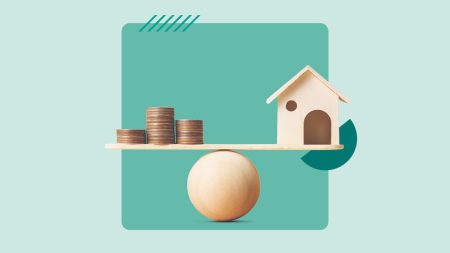Delmaine Donson/Getty Images
Key takeaways
- Many money market accounts blend the features of a checking account and a savings account.
- Checking accounts may offer more liquidity and in some cases, may be best for daily use.
Money market accounts and checking accounts are both deposit accounts available at many banks and credit unions. While many money market accounts and most checking accounts offer the capability of writing checks, there are differences to note between these two types of accounts.
What’s the difference between a money market and a checking account?
Learning the differences between a money market account and a checking account can help you choose which is best for you. Each account caters to different needs and offers unique features that can be beneficial depending on your financial objectives.
| Money market account | Checking account |
| Has a blend of savings and checking account features | Has features such as direct deposit and offers easy access to cash |
| Typically has higher interest rates than traditional checking accounts | Rates are typically much lower than those of money market accounts |
| May come with check-writing privileges and a debit card, depending on the account | Usually comes with a debit card and the ability to write checks |
| Withdrawals and transactions are usually limited to a certain number per month | High liquidity and typically unlimited transactions |
Pros and cons of a money market account
A money market account is a type of deposit account offered by banks and credit unions. It has a blend of savings and checking account features. Like a savings account, a money market account often earns interest, typically at a higher rate than a standard savings or checking account.
However, unlike a traditional savings account, a money market account may come with check-writing privileges and a debit card, which gives you more flexibility to access your funds. Still, it’s worth noting that withdrawals and transactions are usually limited to a certain number per month.
Pros
- May have higher interest rates compared to standard savings accounts or checking accounts
- Some may allow you to access funds through checks or a debit card
- If at a Federal Deposit Insurance Corporation (FDIC) or National Credit Union Association (NCUA) insured financial institution, your funds are protected up to $250,000 per depositor, per FDIC-insured bank, per ownership category
Cons
- Potential limit on the number of monthly transactions
- May have a higher minimum balance requirements compared to checking accounts and savings accounts
- Potential monthly service fees if the minimum balance isn’t maintained
Pros and cons of a checking account
A checking account, on the other hand, is a type of bank account designed for regular transactions. This is the account you would typically use for daily expenses, paying bills and receiving your paycheck. Checking accounts usually come with a debit card, paper checks and unlimited transactions, including deposits, withdrawals and transfers.
While some checking accounts earn interest, the rates are usually much lower than those of money market accounts. However, the primary advantage of a checking account is its high liquidity and unlimited transactions, making it ideal for day-to-day use.
Pros
- Provides easy access to your funds with a debit card and checks
- Typically offer unlimited transactions
- Some checking accounts offer cash back or allow you to earn interest
- If at a financial institution that is FDIC- or NCUA-insured, your funds are protected up to $250,000 per depositor, per FDIC-insured bank, per ownership category
Cons
- Interest rates are generally much lower than those on money market or high-yield savings accounts
- Some checking accounts may require a minimum balance to avoid service fees
- May charge for certain services like using out-of-network ATMs or overdrafts
How to choose a money market and checking account
Selecting the right bank account is an important step in managing your money effectively and meeting your financial goals. Both money market and checking accounts offer unique advantages, but their benefits can only be maximized if they align with your financial needs.
You may choose to use your checking account for daily spending and bills, and a money market account for short-term saving goals, while earning higher interest.
There are many things you should look for in both a checking and a money market account. These include looking for an FDIC- or NCUA-insured financial institution that aligns with your banking habits and preferences, minimal fees, reasonable minimum balance requirements, convenience features (such as mobile banking and direct deposit), enhanced security features and good customer service.
What to look for when opening a money market account
- Competitive interest rate
- A transaction limit you’re comfortable with
- Access to a debit card and the ability to write checks (if this is important to you)
What to look for when opening a checking account
- Wide ATM network and/or ATM reimbursements
- No restriction on transactions
- The ability to earn some interest or cash back (if this is important to you)
- The features that are most important to you (such as overdraft protection, free checks, bill pay)
Bottom line
Choosing between a money market account and a checking account depends on your individual financial needs. If you’re looking for a place to store funds that you don’t need to access frequently, and you want to earn a higher interest rate, a money market account could be a good fit.
If you need an account for daily transactions with easy access to your funds, a checking account might be a better choice. Whichever you choose, always be sure to understand the account’s terms and fees before you make a decision.
FAQ
-
A money market account could be a good choice if you’re looking for a place to keep money that you don’t need immediate access to. It’s also a good choice if you want to earn a higher interest rate than a regular savings or checking account can offer. Another reason to consider a money market account is if you want to write checks or use a debit card directly from the account but don’t plan to do so frequently.
-
Both money market and checking accounts are protected if they’re backed by the Federal Deposit Insurance Corporation (FDIC) in banks and the National Credit Union Administration (NCUA) in credit unions. If they are insured, it makes them a secure choice for your finances. Even if the financial institution fails, your money is protected up to $250,000.
Why we ask for feedback
Your feedback helps us improve our content and services. It takes less than a minute to
complete.
Your responses are anonymous and will only be used for improving our website.
Help us improve our content
Read the full article here









